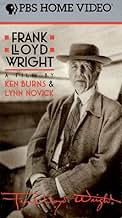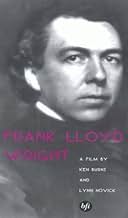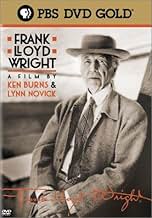A biography of the life and work of the American architect.A biography of the life and work of the American architect.A biography of the life and work of the American architect.
- Nominated for 1 Primetime Emmy
- 3 wins & 2 nominations total
Edward Herrmann
- Narrator
- (voice)
- Directors
- Writer
- All cast & crew
- Production, box office & more at IMDbPro
Storyline
Did you know
- TriviaNot counting all the other delinquent bills that Wright left for his wife, the grocery bill alone came to approximately $30,000 in 2022 dollars.
- ConnectionsFeatured in Ken Burns: America's Storyteller (2017)
- SoundtracksMoonglow
Written by Will Hudson, Edgar De Lange, and Irving Mills
Performed by Benny Goodman and His Orchestra
Courtesy of EMI Music Publishing, Scarsdale Music Corp., and RCA Records Label of BMG Music
Featured review
This is an absorbing and informative documentary on an architect who in most expert opinion - and certainly in his own! - was one of the greatest architects ever. His buildings are of particular interest to film buffs, because they have been used as the locations in many movies. For example, the Ennis-Brown House in LA was the House on Haunted Hill and was also in Blade Runner. But, in fact, where this documentary scores is in focusing on Wright's amazing life, as much as on his architecture. Born in 1867, Wright had early success in building houses around Chicago, but after a scandalous and tragic personal life he was more or less finished professionally by the 1920s.
But then, with the encouragement of his wife Olga Lazowich, his career revived and took off when he was over 60. In the 30 years before his death in 1959 he and his associates designed hundreds of buildings, the best known being the Guggenheim Museum in New York. The Guggenheim is probably his most striking external design, and resembles an abstract sculpture, though ironically Wright had a poor opinion of the 20th century non-objective paintings it houses. The film is admirably linear, with none of the gimmicks found in many modern TV documentaries; it has beautifully angled shots of Wright's best structures; and is enhanced by Beethoven music, since Wright thought musical composition had affinities with architecture.
But then, with the encouragement of his wife Olga Lazowich, his career revived and took off when he was over 60. In the 30 years before his death in 1959 he and his associates designed hundreds of buildings, the best known being the Guggenheim Museum in New York. The Guggenheim is probably his most striking external design, and resembles an abstract sculpture, though ironically Wright had a poor opinion of the 20th century non-objective paintings it houses. The film is admirably linear, with none of the gimmicks found in many modern TV documentaries; it has beautifully angled shots of Wright's best structures; and is enhanced by Beethoven music, since Wright thought musical composition had affinities with architecture.
Details
- Runtime2 hours 26 minutes
- Color
Contribute to this page
Suggest an edit or add missing content
























